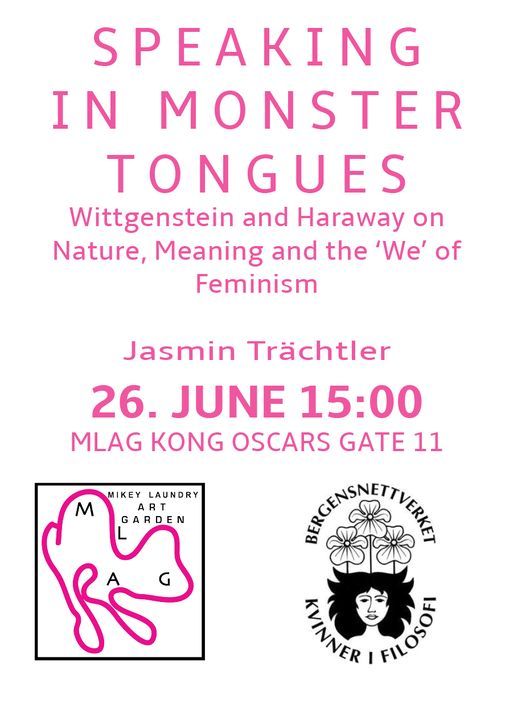 The MLAG discursive programme is proud to team up with the Bergen Network for Women in Philosophy for a garden talk by Ph.D. in Philosophy
The MLAG discursive programme is proud to team up with the Bergen Network for Women in Philosophy for a garden talk by Ph.D. in Philosophy Jasmin Trächtler
Speaking in Monster Tongues – Wittgenstein and Haraway on Nature, Meaning and the ‘We’ of Feminism
A perennial question in philosophy is whether there are distinctions, and therefore we make them, or whether we make distinctions, and therefore they are. This question becomes acute in feminist philosophy, opting for the idea that differences of sex and gender are not naturally given, but that we make them, socially construct them, discursively perform them. Yet, who is the ‘We’ that makes these differences in the first place and who is it that is being differentiated? Who – or what – is the meaning of the feminist ‘We’?
This talk is an essay to explore the ‘We’, if you will: the subject, of feminism by commuting between Wittgenstein’s and Haraway’s views on the relation between nature and meaning. In the area thus staked out, we will first encounter Wittgenstein’s reflections on the connection of nature and the formation of concepts and its inherent phallogocentrism, that is, speaking generally, the dominance of the male perspective in the construction of meaning. To overcome this phallogocentrism and thus gain a positive conception of what a feminist ‘We’ might be, we follow Haraway’s path: This path leads not back to an untouched, pre-found nature but through and within a made, social nature that is both fact and fiction. Here, in the shimmering of fact and fiction, a feminist ‘We’ may emerge as the ‘We’ of an embodied language, aware of its history, its bodies, and its political dimension, in short, a ‘We’ of a monstrous form of life.
Event Venue
Mikey Laundry Art Garden, 11 Kong Oscars Gate, 5017 Bergen, Norway, Bergen
Concerts, fests, parties, meetups - all the happenings, one place.